Senate: Faculty Senate Committees, 2015-2016
Senate Executive Committee
Officers
Chair: Reed Pyeritz (PSOM/
Medicine & Genetics)
Chair-Elect: Laura Perna (GSE/Higher
Education)
Past Chair: Claire Finkelstein (Law)
Secretary: Lydie Moudileno (SAS/
Romance Languages)
Secretary-Elect: Marcella Devoto (PSOM/
Pediatrics & Epidemiology)
Past Secretary: Susan Yoon (GSE)
At-Large Representatives
Delphine Dahan (SAS/Psychology)
Karen Detlefsen (SAS/Philosophy)
Julie Fairman (Nursing)
Martha Farah (SAS/Psychology)
Karen Glanz (PSOM/Biostatistics &
Epidemiology)
David Grazian (SAS/Sociology)
Kelly Jordan-Sciutto (Dental Medicine/Pathology)
James Lok (Veterinary Medicine/Pathobiology)
Angela Mills (PSOM/Emergency Medicine)
Brendan O’Leary (SAS/Political Science)
Philip Rea (SAS/Biology)
Florian Schwarz (SAS/Linguistics)
Assistant Professor Representatives
Erol Akçay (SAS/Biology)
Alison Buttenheim (Nursing)
Daniel J. Singer (SAS/Philosophy)
Penn Association of Senior and Emeritus Faculty (PASEF) Representative
Martin Pring (PSOM/Physiology)
Members Elected by Constituency
1. Annenberg: Kathleen Hall Jamieson
2. SAS: History: Firoozeh Kashani-Sabet
3. SAS: Anthropology, History of Art, Music: Carol Muller (Music)
4. SAS: Mathematics: Ron Donagi
5. SAS: Biology: Brent Helliker
6. SAS: Chemistry, Earth & Environmental
Science, History & Sociology of Science:
Joseph Subotnik (Chemistry)
7. SAS: Classical Studies, Germanic Languages & Literatures, Romance Languages, Slavic Languages & Literatures: Fabio Finotti
(Romance Languages)
8. SAS: Economics: Holger Sieg
9. SAS: English: Rita Barnard
10. SAS: Linguistics, Philosophy: Jianjing Kuang (Linguistics)
11. SAS: East Asian Languages & Civilizations, Near Eastern Languages & Civilizations, Religious Studies, South Asia Studies: Steve Tinney (NELC)
12. SAS: Physics & Astronomy: Masao Sako
13. SAS: Political Science: Nancy J. Hirschmann
14. SAS: Psychology: Loretta Flanagan-Cato
15. SAS: Sociology, Criminology: Melissa
Wilde (Sociology)
16. Dental Medicine: Eric T. Stoopler
17. GSE: Richard Ingersoll
18. Engineering: Bioengineering, Chemical & Biomolecular Engineering, Materials Science & Engineering, Mechanical Engineering &
Applied Mechanics: David Pope (MSE)
19. Engineering: Computer & Information
Science, Electrical & Systems Engineering: Robert Ghrist (ESE)
20. Design: Jackie Tileston
21. Law: Mitch Berman
22. PSOM: Biochemistry & Biophysics,
Biostatistics & Epidemiology, Cancer Biology, Cell & Developmental Biology, Pathology & Laboratory Medicine: Douglas Wiebe
(Biostatistics & Epidemiology)
23. PSOM: Anesthesiology & Critical Care, Obstetrics & Gynecology, Radiation Oncology: David Smith (Anesthesiology & Critical Care)
24. PSOM: Dermatology, Emergency Medicine, Family Medicine & Community Health, Ophthalmology, Orthopaedic Surgery,
Otorhinolaryngology, Psychiatry: James
Palmer (Otorhinolaryngology)
25. PSOM: Genetics, Medical Ethics & Health Policy, Microbiology, Neurology, Neuroscience, Neurosurgery, Physical Medicine &
Rehabilitation, Physiology, Systems Pharmacology & Translational Therapeutics: Michael McGarvey (Neurology)
26. PSOM–Medicine: Cardiovascular Medicine, Endocrinology, Diabetes & Metabolism, Gastroenterology, Infectious Diseases, Pulmonary & Critical Care Medicine, Renal-
Electrolyte & Hypertension, Sleep Medicine: Paul Lanken (Medicine)
27. PSOM–Medicine: General Internal Medicine, Geriatrics, Hematology/Oncology, Rheumatology, Translational Medicine & Human Genetics: Bruce Giantonio (Hematology/Oncology)
28. PSOM: Pediatrics: Maully Shah
29. PSOM: Radiology, Surgery: Jose Pascual (Surgery)
30. Nursing: Eileen Lake
31. Social Policy & Practice: Toorjo Ghose
32. Veterinary Medicine: Animal Biology, Pathobiology: Narayan Avadhani (Animal Biology)
33. Veterinary Medicine: Clinical Studies-New Bolton Center, Clinical Studies-Philadelphia: Erika Krick (Clinical Studies-Philadelphia)
34. Wharton: Accounting, Health Care, Insurance & Risk, Operations & Information Management, Statistics: Robert Stine (Statistics)
35. Wharton: Finance, Legal Studies & Business Ethics, Business & Public Policy: Karen Lewis (Finance)
36. Wharton: Management, Marketing, Real Estate: Christophe Van den Bulte (Marketing)
Senate Committee on Faculty and the Administration (SCOA)
Ken Drobatz, Veterinary Medicine
Irina Marinov, SAS/Earth & Environmental
Science
Emma Meagher, PSOM/Medicine
Pamela Sankar, PSOM/Medical Ethics
Talid Sinno, SEAS
Santosh Venkatesh, SEAS
R. Polk Wagner, Law, Chair
Ex officio
Senate Chair, Reed Pyeritz, PSOM
Senate Chair-Elect, Laura Perna, GSE
Senate Committee on Faculty Development, Diversity and Equity (SCFDDE)
Regina Austin, Law, Chair
Rita Barnard, SAS/English
Kristen Feemster, PSOM/Pediatrics
Carmen Guerra, PSOM/Medicine
Lisa Lewis, Nursing
Mitch Marcus, SEAS
Ex officio
Senate Chair, Reed Pyeritz, PSOM
Senate Chair-Elect, Laura Perna, GSE
Senate Committee on Publication Policy for Almanac
Sunday Akintoye, Dental Medicine
Christine Bradway, Nursing
Al Filreis, SAS/English
Cary Mazer, SAS/English
Carolyn Marvin, Annenberg
Martin Pring, PSOM/Physiology, Chair
Ex officio
Senate Chair, Reed Pyeritz, PSOM
Senate Chair-Elect, Laura Perna, GSE
Senate Committee on Academic Freedom and Responsibility (SCAFR)
Shyam Balganesh, Law, Chair
Sue Ann Bidstrup-Allen, SEAS
Peter Dodson, Veterinary Medicine
Nader Engheta, SEAS
Vivian Gadsden, GSE
Carolyn Marvin, Annenberg
Jon Merz, PSOM/Medical Ethics
Carol Muller, SAS/Music
Diana Robertson, Wharton
Michael Weisberg, SAS/Philosophy
Ex officio
Senate Chair-Elect, Laura Perna, GSE
Senate Committee on Economic Status of the Faculty (SCESF)
Robert Hollebeek, SAS/Physics & Astronomy
Jerry Jacobs, SAS/Sociology
Mark Kahn, PSOM/Cardiovascular Medicine
Susan Margulies, PSOM/Bioengineering, Co-Chair
Andrew Postlewaite, SAS/Economics
Robert Stine, Wharton/Statistics
Andrea Troxel, PSOM/Biostatistics &
Epidemiology, Co-Chair
Ex officio
Senate Past Chair, Claire Finkelstein, Law
Senate Chair, Reed Pyeritz, PSOM
Senate Chair-Elect, Laura Perna, GSE
Faculty Grievance Commission
Parvati Ramchandani, PSOM/Radiology, Chair
Steven Sondheimer, PSOM/Obstetrics &
Gynecology, Past-Chair
Mitch Marcus, SEAS, Chair-Elect
Senate Committee on Faculty and the Academic Mission (SCOF)
Lea Ann Matura, Nursing
Justin McDaniel, SAS/Religious Studies
Mindy Schuster, PSOM/Infectious Diseases, Chair
Amy Sepinwall, Wharton
Tom Sollecito, Dental Medicine
Lyle Ungar, SEAS
Ex officio
Senate Chair, Reed Pyeritz, PSOM
Senate Chair-Elect, Laura Perna, GSE
Senate Committee on Students and Educational Policy (SCSEP)
Paulo Arratia, SEAS
Laura Desimone, GSE
Sharon Irving, Nursing
Jorge Santiago-Aviles, SEAS
Dominic Sisti, PSOM/Medical Ethics
Michael Weisberg, SAS/Philosophy, Chair
Ex officio
Senate Chair, Reed Pyeritz, PSOM
Senate Chair-Elect, Laura Perna, GSE
Membership of University Council, 2015-2016
Steering Committee
The Steering Committee shall consist of the president of the University, the provost, the chair, the chair-elect and the past chair of the Faculty Senate, the chair of the Undergraduate Assembly, the chair of the Graduate and Professional Student Assembly, the chair of the Penn Professional Staff Assembly and the chair of the Weekly-Paid Penn Professional Staff Assembly. Drawn from the Council membership there shall be in addition four faculty members, one graduate/professional student and one undergraduate student elected by the respective governing bodies, as well as one additional member of the Penn Professional Staff Assembly and one additional member of the Weekly-Paid Penn Professional Staff Assembly, each elected by their representative assemblies. The chair of the Faculty Senate shall be the chair of the Steering Committee. In the absence of the chair, or at the request of the chair, the chair-elect shall serve as chair of the Steering Committee. The Council moderator will be an official observer at meetings of the Steering Committee. The secretary of the Council shall serve as secretary of the Steering Committee. Members of the Steering Committee may attend the meetings of Council committees.
—Council Bylaws
Members of
Steering Committee
Laura Bryant
Christophe Van den Bulte
Ray Clark
Lucia DiNapoli
Kuan Evans
Claire Finkelstein, Past-Chair
Karen Glanz
Amy Gutmann
Firoozeh Kashani-Sabet
Jane Meyer
Samantha Miller
Laura Perna, Chair-Elect
Vincent Price
Reed Pyeritz, Chair
Florian Schwarz
Irene Tan
Rosa Vargas
Members of Council Faculty: Forty-five members of the Executive Committee of the Faculty Senate. The Faculty Senate shall insure that each faculty is represented and that at least three assistant professors serve on the Council. The members of the Faculty Senate Executive Committee who are members of the Council shall otherwise be chosen in accordance with the rules of the Faculty Senate.
One full-time lecturer and one full-time member of the research faculty to be selected to serve two-year terms by vote facilitated by the Office of the Secretary in consultation with the Steering Committee of the full-time lecturers and research faculty, respectively, from a slate consisting of the five lecturers and the five members of the research faculty receiving the largest number of nominations by lecturers and members of the research faculty. If the Steering Committee receives fewer than five nominations for either group, additional nominations shall be solicited from the constituency representatives of the Senate Executive Committee.
Administrative and Staff: Eleven administrative officers, including the president, the provost and nine members of the administration to be appointed annually by the president, at least five of whom shall be deans of faculties.
Two elected representatives of the Penn Professional Staff Assembly. One elected representative of the Librarians Assembly. Two elected representatives of the Weekly-Paid Penn Professional Staff Assembly.
Students: Fifteen graduate and professional students elected as members of the Graduate and Professional Student Assembly. The Graduate and Professional Student Assembly shall insure that, to the extent possible, each school is represented. The members of the Graduate and Professional Student Assembly who are members of the Council shall otherwise be chosen in accordance with the rules of the Graduate and Professional Student Assembly.
Fifteen undergraduate students elected as members of the Undergraduate Assembly. The Undergraduate Assembly shall insure that, to the extent possible, each undergraduate school is represented. The members of the Undergraduate Assembly who are members of the Council shall otherwise be chosen in accordance with the rules of the Undergraduate Assembly.
One elected representative of the United Minorities Council.
—Council Bylaws
Members of the
Administration
Michael Delli Carpini
Steve Fluharty
Amy Gutmann
William Gipson
John Jackson
Anita Mastroieni
Vincent Price
Maureen Rush
Valarie Swain-Cade McCoullum
Marilyn Jordan Taylor
Toni Villarruel
Elected by Faculty At Large
Reed Pyeritz, Chair
Lydie Moudileno, Secretary
Laura Perna, Chair-Elect
Marcella Devoto, Secretary-Elect
Claire Finkelstein, Past Chair
Karen Glanz
Florian Schwarz
Penn Association for Senior & Emeritus Faculty
Martin Pring, PASEF Representative
Elected by Faculty Constituency
1. Kathleen Hall Jamieson
2. Firoozeh Kashani-Sabet
3. Carol Muller
4. Ron Donagi
5. Brent Helliker
6. Joseph Subotnik
7. Fabio Finotti
8. Holger Sieg
9. Rita Barnard
10. Jianjing Kuang
11. Steve Tinney
12. Masao Sako
13. Nancy J. Hirschmann
14. Loretta Flanagan-Cato
15. Melissa Wilde
16. Eric T. Stoopler
17. Richard Ingersoll
18. David Pope
19. Robert Ghrist
20. Jackie Tileston
21. Mitch Berman
22. Douglas Wiebe
23. David Smith
24. James Palmer
25. Michael McGarvey
26. Paul Lanken
27. Bruce Giantonio
28. Maully Shah
29. Jose Pascual
30. Eileen Lake
31. Toorjo Ghose
32. Narayan Avadhani
33. Erika Krick
34. Robert A. Stine
35. Karen Lewis
36. Christophe Van den Bulte
Assistant Professors
Erol Akçay
Alison Buttenheim
Daniel J. Singer
Lecturers and Research Faculty Members
Christina Frei
Itzhak Nissim
Graduate/Professional Students
Miriam Archibong
Cherag Bhagwagar
Laura Bryant
Taylor-Rae Collins-Headley
Abimbola Dairo
Katherine France
Jin Soo Han
Allison Hill
Taylor Knoche
Samantha Miller, GAPSA Chair
Justine Sefcik
Tara Stonex
Erica Sucher
Kelsey Van Gelder
Paul Welfer
Undergraduate Students
Albert Cai, APSC
Victoria Chen, Lambda Alliance
Ray Clark, UA Vice-President
Tunmise Fawole, UMOJA
Nicolas Garcia, LC
Jacob Henner, UA
Michael Karam, UA
Nayab Khan, MSA
Jennifer Knesbach, College
Republicans
Jane Meyer, UA President
Elise Pi, AIS
Jack Pilutti, SSAP
Eric Tepper, PRISM
Leah Quinn, UA
Megan Yan, PAGE
United Minorities Council
Rashad Nimr
Penn Professional Staff
Assembly
Lucia DiNapoli, Chair
Kuan Evans, Chair-Elect
Weekly-Paid Penn
Professional Staff Assembly
Rosa Vargas, Chair
Irene Tan, Co-Chair
Librarians Assembly
Rachelle Nelson
Parliamentarian
Lauren Steinfeld*
ROTC Representative
Colonel Kenneth DeTreux*
Vice President and Secretary
Leslie Laird Kruhly*
Moderator
Therese Richmond*
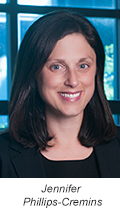


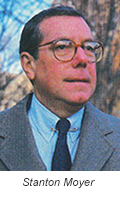 F. Stanton Moyer, W’51, a noted venture capitalist and former Penn Trustee, died on October 7 in Haverford, PA. He was 86 years old.
F. Stanton Moyer, W’51, a noted venture capitalist and former Penn Trustee, died on October 7 in Haverford, PA. He was 86 years old.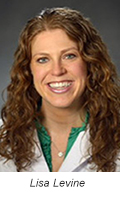
 Dennis E. Discher is the Robert D. Bent Professor of Chemical and Biomolecular Engineering in the School of Engineering & Applied Science (SEAS). He joined Penn in 1996 following postdoctoral work in computational biophysics as a U.S. National Science Foundation International Fellow at the University of British Columbia and Simon Fraser University. He received his PhD jointly from the University of California, Berkeley and San Francisco for studies of cell membrane physics and spliceform biochemistry. He holds secondary appointments in bioengineering and in mechanical engineering & applied mechanics and is a member of Graduate Groups in Cell & Molecular Biology, Pharmacology and Physics. His research has focused on stem cell differentiation in relation to mechanics of microenvironments that differ between tissues and in disease. His group uses engineered polymer systems in studies that have extended to questions on drug carriers, particularly the roles of nanoscale physical properties and immune system interactions. Dr. Discher was awarded a Presidential Early Career Award for Scientists and Engineers (PECASE) by the National Science Foundation in 1999, and was elected in 2012 to the National Academy of Engineering (NAE). He is the principal investigator at Penn of a National Cancer Institute-funded Physical Sciences Oncology Center, which fosters research into new physical principles in cancer development and straddles the SEAS, the Perelman School of Medicine and SAS. He has authored more than 200 widely cited publications in journals ranging from Science and Cell to Physical Review Letters, Nature Materials and Journal of the American Chemical Society.
Dennis E. Discher is the Robert D. Bent Professor of Chemical and Biomolecular Engineering in the School of Engineering & Applied Science (SEAS). He joined Penn in 1996 following postdoctoral work in computational biophysics as a U.S. National Science Foundation International Fellow at the University of British Columbia and Simon Fraser University. He received his PhD jointly from the University of California, Berkeley and San Francisco for studies of cell membrane physics and spliceform biochemistry. He holds secondary appointments in bioengineering and in mechanical engineering & applied mechanics and is a member of Graduate Groups in Cell & Molecular Biology, Pharmacology and Physics. His research has focused on stem cell differentiation in relation to mechanics of microenvironments that differ between tissues and in disease. His group uses engineered polymer systems in studies that have extended to questions on drug carriers, particularly the roles of nanoscale physical properties and immune system interactions. Dr. Discher was awarded a Presidential Early Career Award for Scientists and Engineers (PECASE) by the National Science Foundation in 1999, and was elected in 2012 to the National Academy of Engineering (NAE). He is the principal investigator at Penn of a National Cancer Institute-funded Physical Sciences Oncology Center, which fosters research into new physical principles in cancer development and straddles the SEAS, the Perelman School of Medicine and SAS. He has authored more than 200 widely cited publications in journals ranging from Science and Cell to Physical Review Letters, Nature Materials and Journal of the American Chemical Society.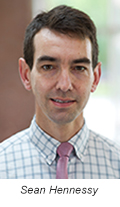 Sean Hennessy is a professor of epidemiology in the department of biostatistics & epidemiology at the Perelman School of Medicine. He received his PharmD in clinical pharmacy from the Philadelphia College of Pharmacy and Science and his PhD in epidemiology from Penn. Dr. Hennessy’s primary field of interest is pharmacoepidemiology, the study of the health effects of drugs and other medical products in populations. He is a past scientific chair and past president of the International Society for Pharmacoepidemiology and has served on the FDA’s Drug Safety and Risk Management Advisory Committee. In 2015 he began a three-year term on the board of directors of the American Society for Clinical Pharmacology and Therapeutics. He is also a co-editor of the books Pharmacoepidemiology (5th edition) and Textbook of Pharmacoepidemiology (2nd edition) and is editor for the Americas of the journal Pharmacoepidemiology and Drug Safety. He has received the 2005 Young Alumnus Award from the University of the Sciences in Philadelphia, the 2007 Leon I. Goldberg Young Investigator Award from the American Society for Clinical Pharmacology and Therapeutics and the 2013 Samuel Martin Health Evaluation Sciences Research Award from the Perelman School of Medicine. Dr. Hennessy also directs Penn’s Center for Pharmacoepidemiology Research and Training and pharmacoepidemiology training programs associated with the center. He teaches clinical epidemiology to medical and graduate students and is active in promoting evidence-based practice at Penn Medicine, co-chairing its Drug Use and Effects Committee and serving on its Pharmacy and Therapeutics Committee. Dr. Hennessy’s clinical program has received two Quality and Safety Awards from UPHS.
Sean Hennessy is a professor of epidemiology in the department of biostatistics & epidemiology at the Perelman School of Medicine. He received his PharmD in clinical pharmacy from the Philadelphia College of Pharmacy and Science and his PhD in epidemiology from Penn. Dr. Hennessy’s primary field of interest is pharmacoepidemiology, the study of the health effects of drugs and other medical products in populations. He is a past scientific chair and past president of the International Society for Pharmacoepidemiology and has served on the FDA’s Drug Safety and Risk Management Advisory Committee. In 2015 he began a three-year term on the board of directors of the American Society for Clinical Pharmacology and Therapeutics. He is also a co-editor of the books Pharmacoepidemiology (5th edition) and Textbook of Pharmacoepidemiology (2nd edition) and is editor for the Americas of the journal Pharmacoepidemiology and Drug Safety. He has received the 2005 Young Alumnus Award from the University of the Sciences in Philadelphia, the 2007 Leon I. Goldberg Young Investigator Award from the American Society for Clinical Pharmacology and Therapeutics and the 2013 Samuel Martin Health Evaluation Sciences Research Award from the Perelman School of Medicine. Dr. Hennessy also directs Penn’s Center for Pharmacoepidemiology Research and Training and pharmacoepidemiology training programs associated with the center. He teaches clinical epidemiology to medical and graduate students and is active in promoting evidence-based practice at Penn Medicine, co-chairing its Drug Use and Effects Committee and serving on its Pharmacy and Therapeutics Committee. Dr. Hennessy’s clinical program has received two Quality and Safety Awards from UPHS.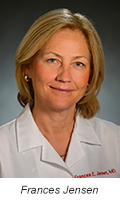 Frances E. Jensen is a professor of neurology, chair of the department of neurology and co-director of the Penn Medicine Translational Neuroscience Center at the Perelman School of Medicine. Prior to coming Penn, she was a professor of neurology at Harvard Medical School and a senior neurologist at both Brigham and Women’s Hospital and Children’s Hospital, Boston. Dr. Jensen received her medical degree from Cornell University Medical College and completed her residency in internal medicine at Brigham and Women’s Hospital. She was chief resident in neurology at the Harvard Longwood Neurology Training Program, followed by a fellowship at Harvard Medical School. Her research has focused on investigating mechanisms of epilepsy as well as their age-dependent differences, with special attention to the interactions between brain development, brain injury, epilepsy and cognition. In addition to receiving the NIH Director’s Pioneer Award and the American Epilepsy Research Recognition Award, she has been continuously funded by NIH since 1987 and has trained over 30 research fellows. Dr. Jensen has been a council member of the Society for Neuroscience and was president of the American Epilepsy Society in 2012. She serves on a number of patient and research advocacy boards and is a fellow of the American College of Physicians, a member of the editorial board of Annals of Neurology and a reviewing editor for the Journal of Neuroscience. Dr. Jensen is the author of more than 150 manuscripts and the author of the widely acclaimed book, The Teenage Brain.
Frances E. Jensen is a professor of neurology, chair of the department of neurology and co-director of the Penn Medicine Translational Neuroscience Center at the Perelman School of Medicine. Prior to coming Penn, she was a professor of neurology at Harvard Medical School and a senior neurologist at both Brigham and Women’s Hospital and Children’s Hospital, Boston. Dr. Jensen received her medical degree from Cornell University Medical College and completed her residency in internal medicine at Brigham and Women’s Hospital. She was chief resident in neurology at the Harvard Longwood Neurology Training Program, followed by a fellowship at Harvard Medical School. Her research has focused on investigating mechanisms of epilepsy as well as their age-dependent differences, with special attention to the interactions between brain development, brain injury, epilepsy and cognition. In addition to receiving the NIH Director’s Pioneer Award and the American Epilepsy Research Recognition Award, she has been continuously funded by NIH since 1987 and has trained over 30 research fellows. Dr. Jensen has been a council member of the Society for Neuroscience and was president of the American Epilepsy Society in 2012. She serves on a number of patient and research advocacy boards and is a fellow of the American College of Physicians, a member of the editorial board of Annals of Neurology and a reviewing editor for the Journal of Neuroscience. Dr. Jensen is the author of more than 150 manuscripts and the author of the widely acclaimed book, The Teenage Brain. A pioneer and innovator throughout her career, Judith Rodin was the first woman named to lead an Ivy League institution and is the first woman to serve as the Rockefeller Foundation’s president. While president of the University of Pennsylvania, Dr. Rodin spearheaded groundbreaking programs that engaged the campus with the surrounding community and provided a model that is replicated by other universities nationally and internationally. Sponsored by the University of Pennsylvania.
A pioneer and innovator throughout her career, Judith Rodin was the first woman named to lead an Ivy League institution and is the first woman to serve as the Rockefeller Foundation’s president. While president of the University of Pennsylvania, Dr. Rodin spearheaded groundbreaking programs that engaged the campus with the surrounding community and provided a model that is replicated by other universities nationally and internationally. Sponsored by the University of Pennsylvania.
 Remember: Fall back, Spring forward! On Sunday, November 1 at 2 a.m., Daylight Saving Time comes to an end. This means we can all sleep an extra hour Sunday morning and still have breakfast at the usual time. It also means we lose an hour of daylight just around the time most of us are heading home from work or school. Penn’s Division of Public Safety (DPS) wants to remind you of the following tips on how to stay safe during your commute:
Remember: Fall back, Spring forward! On Sunday, November 1 at 2 a.m., Daylight Saving Time comes to an end. This means we can all sleep an extra hour Sunday morning and still have breakfast at the usual time. It also means we lose an hour of daylight just around the time most of us are heading home from work or school. Penn’s Division of Public Safety (DPS) wants to remind you of the following tips on how to stay safe during your commute:
 The Wharton School powers business radio on Sirius XM 111, broadcasting business and management knowledge for career success. It includes Knowledge@Wharton, along with Career Talk and Measured Thoughts; see
The Wharton School powers business radio on Sirius XM 111, broadcasting business and management knowledge for career success. It includes Knowledge@Wharton, along with Career Talk and Measured Thoughts; see 